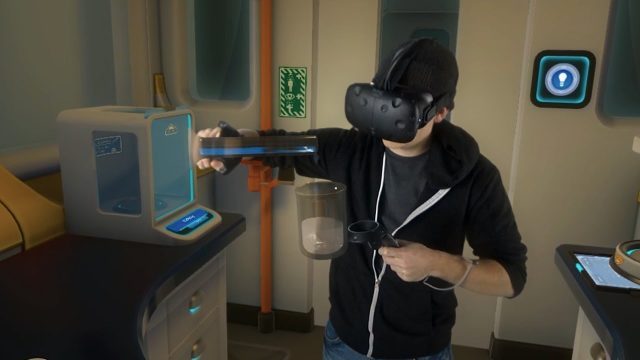I Expect You to Die developer Schell Games have released a trailer for their latest project SuperChem VR, an incredibly fun looking way to teach chemistry and perhaps a glimpse into the potential future for VR in education.
We’ve seen a lot of application attempt to capture some of the potential VR enthusiasts of immersive computing know VR can deliver. But Jessie Schell’s studio, responsible for the ingenious Bond-esque VR puzzle title I Expect You to Die, seem to really be onto something with their latest title SuperChem, and I think it may be one to watch.
SuperChem’s concept is simple; Utilise the immersive properties of virtual reality to provide students with both a safe and fun environment in which to learn about chemistry. Doing this in VR means there’s no danger of harm from caustic or corrosive chemicals, no risk or accidental fire damage and, perhaps most importantly, you can give the user access to infinite resources and ensure maximum engagement by designing the setting to be fun and to encourage curiosity.
“Teachers report that learning about chemicals, lab equipment and how to use the equipment correctly can be a slow process,” says Jessie Schell, CEO of Schell Games, “So SuperChem VR is designed to allow you to learn about these concepts in a safe, interactive and immersive way.”
The application as it stands puts the user in a futuristic space laboratory, surrounded by chemical dispensers, but also very un-futuristic, very familiar conical flasks and measurement cylinders. You can access different chemicals which are virtually synthesised on command and then mix any of them using the same physical actions you’d perform in real life. You can mad scientist your heart out, analysing the results as you go and, should you get stuck, there’s a friendly assistant to guide and prompt you in the right direction and to set you individual tasks and experiments to carry out. “This combination of an immersive and engaging environment with scaffolding for exploring chemistry allows you to have fun while learning,” says Schell.
 The project was created with support from the Institution of Education Sciences (part of the U.S. Department of Education) along with the Small Business Innovation Research although it’s not clear if or how it’ll be rolled out for actual use in educational institutions. From my perspective however, the format seems like a winner and for someone like me who really struggled grappling with some aspects of science at school, despite having a keen interest, I think something like SuperChem VR would have been a real help in earning my engagement.
The project was created with support from the Institution of Education Sciences (part of the U.S. Department of Education) along with the Small Business Innovation Research although it’s not clear if or how it’ll be rolled out for actual use in educational institutions. From my perspective however, the format seems like a winner and for someone like me who really struggled grappling with some aspects of science at school, despite having a keen interest, I think something like SuperChem VR would have been a real help in earning my engagement.
What do you think of SuperChem VR‘s concept and its practical uses for programs like it in education today and in the future?







